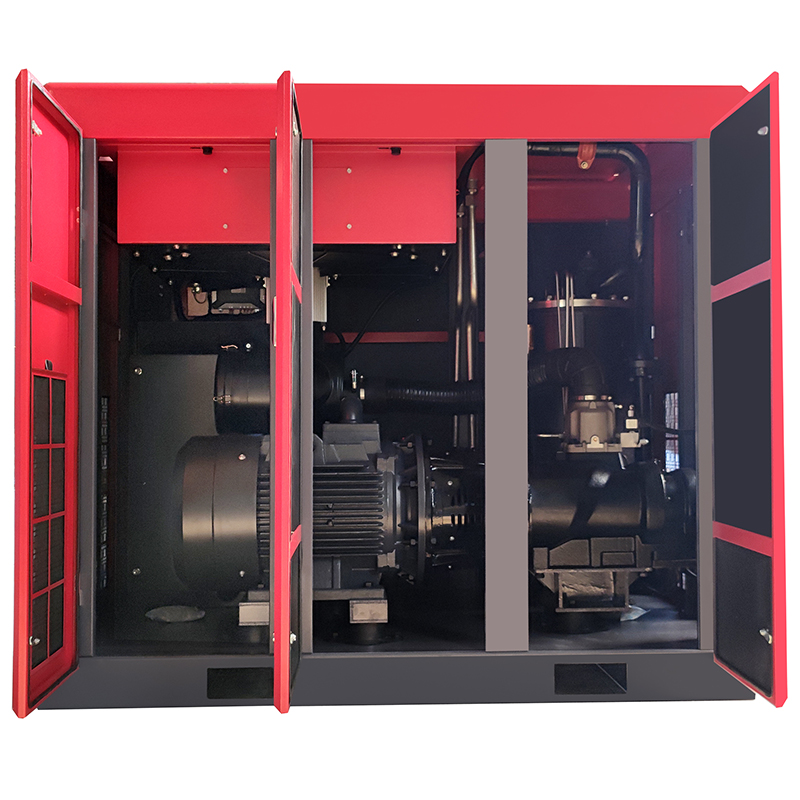
Screw air compressors are integral components in a wide range of industries, from manufacturing to construction, due to their efficiency and reliability. One of the key factors that ensures their longevity and optimal performance is the proper selection of lubricating oil. The right oil not only reduces friction but also enhances cooling, prevents corrosion, and ensures smooth operation. In this article, we’ll guide you through the process of choosing the best lubricating oil for your screw air compressor to help you maintain its efficiency and extend its lifespan.
1. Understanding the Importance of Lubricating Oil in Screw Air Compressors
Lubricating oil in screw air compressors serves several critical functions:
Lubrication:
The primary role of lubricating oil is to reduce friction between the moving parts of the compressor, such as the rotors and bearings. This minimizes wear and tear, contributing to smoother operation and less frequent breakdowns.
Cooling:
Screw compressors generate heat during the compression process. The lubricating oil helps dissipate this heat, preventing the compressor from overheating. It absorbs heat from the parts and carries it away from the compression chamber, thereby maintaining optimal operating temperatures.
Protection Against Corrosion:
Oil forms a protective barrier on metal surfaces, preventing moisture and contaminants from causing rust and corrosion. This is especially important in environments with high humidity or where the compressor is exposed to dust and debris.
Cleaning and Sealing:
The oil also acts as a cleaning agent, trapping dust, dirt, and other particles. It keeps the internal components clean and free of contaminants. Additionally, it ensures proper sealing between components, preventing leaks and improving efficiency.
2. Factors to Consider When Selecting Lubricating Oil
Selecting the right lubricating oil requires understanding the specific needs of your compressor. Here are the key factors to consider:
Viscosity:
Viscosity refers to the thickness of the oil and how easily it flows. The correct viscosity ensures that the oil flows efficiently through the compressor, providing effective lubrication and cooling. The oil must have the right thickness to maintain a protective film between the moving parts without restricting their movement. If the oil is too thick, it may not circulate well, while if it’s too thin, it may not provide adequate protection.
Operating Temperature:
The compressor’s operating temperature plays a crucial role in oil selection. If the compressor operates in extremely hot or cold conditions, you’ll need oil that can handle those temperatures without breaking down. High temperatures can cause oil to degrade faster, while very low temperatures can cause thickening, leading to inefficient lubrication. Ensure that the oil is suitable for the temperature range in which your compressor operates.
Compressor Type (Oil-Injected vs. Oil-Free):
Oil-injected screw compressors use oil not just for lubrication but also for cooling and sealing. Conversely, oil-free screw compressors do not use oil in the compression chamber, though they still require oil for the bearings and other non-compression components. Make sure to select oil that is compatible with your compressor type.
Manufacturer Specifications:
Always refer to the manufacturer’s guidelines when selecting oil for your screw air compressor. Manufacturers design compressors to operate optimally with specific types of oil. Using oil that doesn’t meet the manufacturer’s recommendations can lead to performance issues, increased wear, and even failure.
3. Types of Lubricating Oils for Screw Air Compressors
There are several types of lubricating oils available for screw air compressors, each with its own benefits and considerations.
Mineral Oils:
Mineral oils are derived from crude oil through a refining process. These oils are commonly used in screw compressors and are often less expensive than synthetic oils. They provide basic lubrication but may require more frequent oil changes. Mineral oils are best suited for compressors that operate under moderate conditions with low to average workloads.
Synthetic Oils:
Synthetic oils are engineered using chemical processes to provide superior performance. They are more stable than mineral oils and perform better at extreme temperatures. Synthetic oils also last longer and can extend the oil change interval. They are ideal for high-performance compressors that operate in challenging conditions, such as high temperatures or heavy-duty applications.
Semi-Synthetic Oils:
Semi-synthetic oils combine both mineral and synthetic oils to offer a balance between performance and cost. These oils offer better lubrication and longer intervals between changes compared to mineral oils but at a lower price point than fully synthetic oils. Semi-synthetic oils are suitable for compressors that operate under moderate to heavy workloads.
Vegetable-Based Oils:
Vegetable-based oils are an environmentally friendly alternative to traditional mineral and synthetic oils. They are biodegradable and come from renewable sources, making them a more sustainable option. While they perform similarly to synthetic oils, they may not be suitable for all compressors and may be more expensive. These oils are often used in operations where environmental impact is a key concern.
4. Key Oil Additives for Screw Air Compressors
Lubricating oils often contain additives to enhance their performance. Here are some important additives to look for:
Anti-Wear Additives:
These additives form a protective layer on metal surfaces, reducing friction and wear. They are especially important in high-load applications, as they prevent damage to the compressor’s critical components, such as the rotors and bearings.
Corrosion Inhibitors:
Corrosion inhibitors prevent moisture and contaminants from causing rust and corrosion on internal components. These additives are crucial for compressors that operate in humid or dusty environments, as they help maintain the integrity of the system.
Detergents and Dispersants:
These additives help keep the oil clean by breaking down and dispersing contaminants like dirt, soot, and sludge. They prevent the buildup of harmful deposits that could block oil passages and reduce lubrication efficiency.
Anti-Foaming Agents:
Foam can reduce the effectiveness of oil by preventing it from circulating properly. Anti-foaming agents are added to the oil to prevent foam formation, ensuring that the oil flows smoothly and provides consistent lubrication.
5. Maintenance and Oil Change Intervals
Oil Change Frequency:
The frequency of oil changes depends on several factors, including operating conditions, compressor load, and the type of oil used. Typically, oil should be changed every 1,000 to 2,000 operating hours, but this can vary. In harsh conditions, such as high humidity or continuous high-load operations, oil changes may need to be more frequent.
Oil Condition Monitoring:
Regular monitoring of oil condition is crucial for identifying potential problems before they lead to compressor failure. You can monitor oil by checking its color, smell, and consistency. Oil analysis tests can also detect contaminants or early signs of degradation, allowing for timely oil changes.
Oil Filter Replacement:
Oil filters remove impurities from the oil and ensure smooth operation. Regular replacement of the oil filter is important to maintain efficient lubrication. A clogged filter can reduce oil flow and cause damage to compressor components.
6. Common Mistakes in Oil Selection and Usage
Choosing the Wrong Oil Type:
One of the most common mistakes is using the wrong type of oil. For instance, using a synthetic oil in an application that requires mineral oil can cause problems, as synthetic oils often have different properties that may not be compatible with certain components.
Overfilling or Underfilling Oil:
Both overfilling and underfilling the oil can lead to inefficiencies. Overfilling can cause excessive foaming, while underfilling can result in insufficient lubrication and overheating. Always ensure that the oil level is within the manufacturer’s specified range.
Neglecting Manufacturer Guidelines:
Ignoring the manufacturer’s oil specifications is a mistake that can lead to premature wear and failure. Always follow the recommended oil type, viscosity, and change intervals provided by the manufacturer to ensure optimal performance and longevity.
7. Environmental and Safety Considerations
Eco-Friendly Oil Options:
With increasing environmental awareness, many companies are opting for biodegradable and eco-friendly lubricating oils. These oils are made from renewable resources and are designed to break down naturally if spilled. If sustainability is important to your operation, consider using these oils.
Proper Oil Disposal:
Used oil must be disposed of properly to prevent environmental contamination. Never pour used oil down drains or onto the ground. Most areas have recycling programs for used oil, which should be followed to reduce the environmental impact.
Conclusion
Selecting the right lubricating oil for your screw air compressor is essential for ensuring its performance, efficiency, and longevity. By considering factors like viscosity, operating temperature, and compressor type, you can choose an oil that meets the needs of your system. Regular oil changes, using high-quality oils with the right additives, and monitoring the oil condition will keep your compressor running at its best, saving you time, money, and costly repairs. Always follow the manufacturer’s guidelines to ensure your compressor remains in top condition for years to come.


